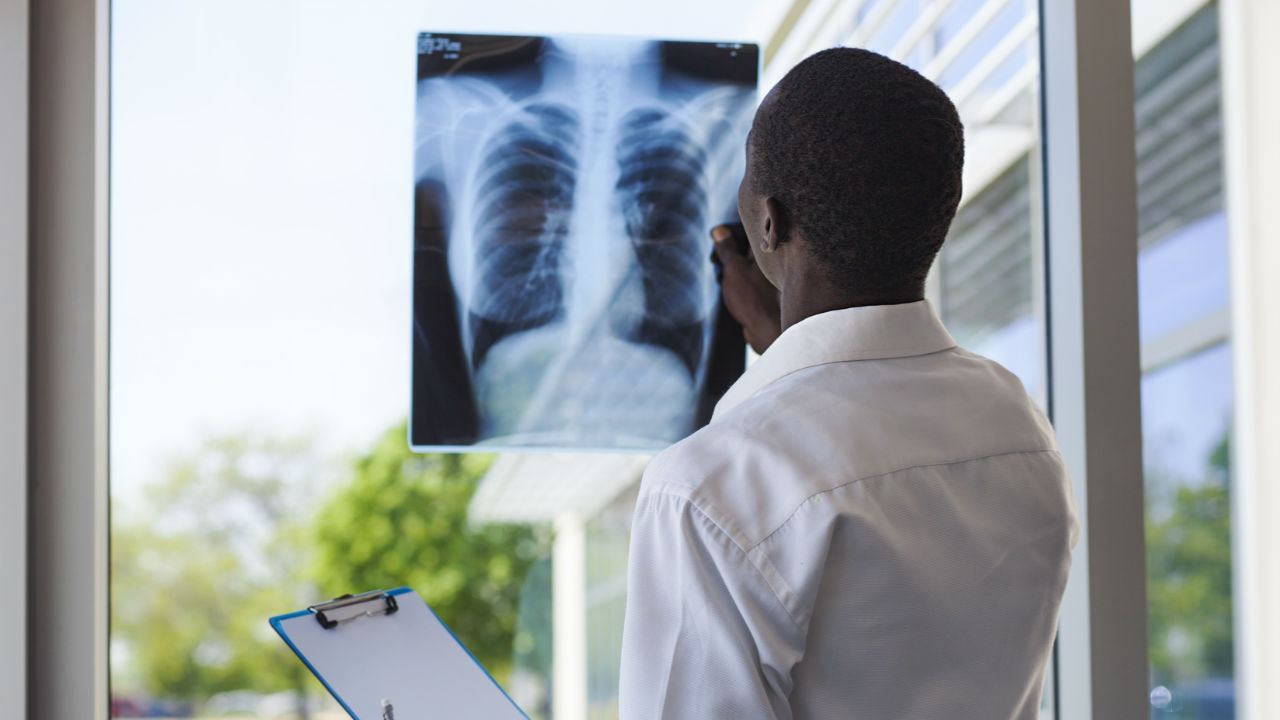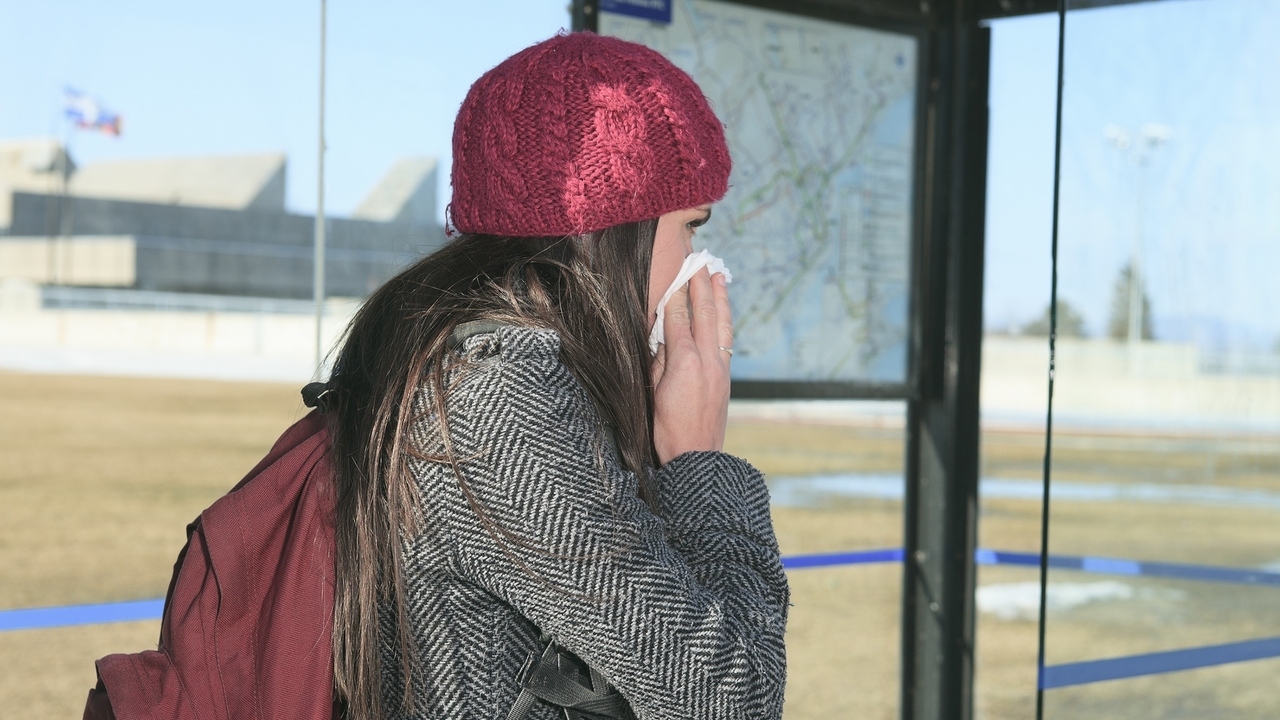 Olesya Shelomova/fotolia
Olesya Shelomova/fotolia
What is Hamman-Rich Syndrome
Hamman-Rich Syndrome is also known as acute interstitial pneumonia. It is an uncommon type of pneumonia for which researchers have not yet found a cause (idiopathic). It affects otherwise healthy individuals. The underlying condition may worsen without symptoms appearing for a long period of time, but when the symptoms do manifest they come on very suddenly and "acutely".
The condition received its name from the doctors who discovered the disease in 1939, Drs. Hamman and Rich.
Acute interstitial pneumonia has similar symptoms to acute respiratory distress syndrome, and may be misdiagnosed as such.
Pneumonia results when tissues of the lungs become inflamed in reaction to infection. Interstitial pneumonia, by comparison, is a long-term condition that affects the connective tissue of the lungs. The inflammation is caused by the build up of white blood cells and plasma in the alveoli (the tiny sac that facilitate the carbon dioxide/oxygen exchange in the bloodstream). With interstitial pneumonia, the inflammation also extends into the bronchioles - small airways that branch off into the lungs.
If the inflammation lasts long enough, the fluid hardens into scar tissue (fibrosis). If there is enough scar tissue, over time alveoli will be destroyed and the space filled with cysts. Over time, the bronchi and the walls of the bronchi widen, or are destroyed resulting in the lungs shrinking.
Sixty percent of those with acute interstitial pneumonia die within six months of the appearance of symptoms.
Symptoms of Hamman-Rich Syndrome
As stated earlier, symptoms of Hamman-Rich Syndrome or acute interstitial pneumonia are similar to those observed in acute respiratory distress syndrome, which are:
- shortness of breath
- rapid, shallow breathing
- crackling or wheezing sounds in the lungs
- cyanosis (blue tinge) to the skin
- heart and brain function issues (rapid heart rate, difficulty concentrating, forgetfulness) because of long-term reduced oxygen supply
Diagnosis and Treatment of Acute Interstitial Pneumonia
Diagnosis of acute interstitial pneumonia is usually confirmed through CT scans, lung biopsy, and tests that measure pulmonary function.
The goal of treatment is to prevent complete respiratory failure and keep the patient alive and comfortable until the condition resolves. Treatment often involves use of a ventilator in the event of respiratory failure, and administration of corticosteroids (although it is not known how effective these medications are).
For those who survive, lung function will improve over time, but the condition may return.
Sources: www.uptodate.com; www.wrongdiagnosis.com; www.medfriendly.com; www.merck.com






Add a Comment72 Comments
My brother in laws Fiance just passed away from this on Friday! It was so sudden, within a month of finding out what was really bothering her. In this particulat case, it seems she first broke out with rashes all over her body months before. Its so scary to me. Is this something that is contagious? My son is sick with high fever, and slight wheezing. I took him to the ER, and they did do a chest x-ray and saw no pnuemonia. I dont know, Im just sad for her and scared and having anxiety over this for my family because there is limited information. How is it contacted, is it something heriditary, i just would like some answers!
October 12, 2010 - 5:26amThis Comment
Since as yet doctors don't know what causes acute interstitial pneumonia it is near impossible to say who or when it will affect someone. People get colds with cough or pneumonia all the time, but the vast majority of those will not experience acute interstitial pneumonia. Colds and pneumonia are both transmissible, but again most will fight those off as normal. The really frustrating part of this disease is that it seems to attack otherwise healthy people.
If your son's symptoms have been gradual in onset and severity then there is likely no concern. But if they seemed to have come on rather suddenly with no warning, then I would be concerned.
Certainly, if your son's symptoms worsen take him back to your doctor or ER and keep checking up with an x-ray so long as the symptoms keep worsening. The fever should dissipate within two or three days. If it remains high for longer, then he definitely needs to be seen again.
There is some research that suggests that there is a familial link. While this article is somewhat technical, and doesn't address acute interstitial pneumonia directly, it might be of help...
http://ajrccm.atsjournals.org/cgi/reprint/200408-1104OCv1.pdf
It's not surprising that you might be somewhat paranoid since your son became sick so shortly after the death of your brother-in-law's fiance, particularly if your son was exposed to her when she was sick. But that is no guarantee that he's going come down with it too.
Did they run anymore tests, blood tests, saliva tests or anything? Did the results come back?
Don't know if that helps at all.
Darlene
October 12, 2010 - 1:27pmThis Comment
My step-daughter who is 19, was diagnosed with this yesterday. We have never heard of it and from what we are reading, we are terrified. She had been sick for a couple of weeks and went to the doctor. They diagnosed her with pneumonia. After her breathing treatments and antibiotics at home she did not get any better. She went to the ER with a fever and was then admitted last Monday. On Thursday, she was sent to a different hospital and put into ICU. They said her lymph nodes were inflamed and she had masses on her lung. They took tissue samples from the lymph and lung for biopsy. During this, she was put on a ventilator because she was struggleing to breathe. Her levels have gone from 66% to 80% to 90% yesterday and down to 75% this morning. Are there any questions that we should be asking the physicians or do you have any insight on this?
Penny
September 23, 2010 - 6:48amThis Comment
Penny, how is your step-daughter now? I hope everything turned out ok. I actually survived this illness less than a year ago. Although I am left with only 55% lung function, I survived. The doctors said it was because I am so young. (29). I'm praying that she pulled through.
August 19, 2011 - 9:53amThis Comment
Penny, how is your step-daughter now? I hope everything turned out ok. I actually survived this illness less than a year ago. Although I am left with only 55% lung function, I survived. The doctors said it was because I am so young. (29). I'm praying that she pulled through.
August 19, 2011 - 9:50amThis Comment
Penny,
We are here for you guys...please don't be afraid to ask us for anything you may need...anything!!!!
September 23, 2010 - 3:22pmThis Comment
Penny,
From Charlotte
September 23, 2010 - 3:23pmThis Comment
Penny,
I'm not one to beat around the bush, but even in doing the research for this article, it was very frightening. One of the things that makes it so frightening is it presents clinically like pneumonia and it's only when pneumonia meds don't work that the doctors look for something else and by then this condition has already taken a significant toll on the body.
Sounds like they've done the CT scans, biopsy and lung function tests which are all needed to confirm what is actually happening to the tissues and airways.
I would make sure that you have a respirologist (someone who specializes in respiratory ailments) present or at least assure yourself that the doctors currently treating your daughter have experience or knowledge in this area. Specialists have a much deeper understanding of some of these things than a general practitioner. Perhaps they can work in conjunction with the treating physician and may be able to suggest a method of treatment that may not have been tried.
As my article states, treatment at this point is focusing on keeping the lungs functioning so the antibiotics can deal with the infection. Still 75% is not bad. It's worse than yesterday, but still not bad.
Unfortunately, my research did not turn up any information on the right amount pressure to be used on the ventilator in this case (sometimes in younger children and infants the pressure needs to be adjusted because they have smaller lungs). You may want to investigate that. And how much oxygen she's getting. If the decrease has happened while at the same pressure and amount of oxygen, then it is likely that scarred tissue is starting to form. Nothing you can really do about that except hope that the treatment will prevent too much of it.
But, then again, I'm only going by what I learned through my research. I'm not a medical professional.
My article on the lymphatic system will explain why her lymphnodes are inflamed, but briefly, they are inflamed because they're battling what's affecting her lungs. It is actually a good thing. It is important to keep the lymphatic fluid flowing, though, and not let it sit stagnant. Lymphatic fluid flows with the movement of the body. If she is just lying there, the fluid isn't moving. Use massages especially along the torso and up around under her right clavicle where the lymphatic fluid joins with the circulation system. Start with her feet and work your way up. Exercise her legs and arms as well. This will keep the lymphatic fluid moving, but also keep her muscles from atrophying while she's lying there.
Western medicine doesn't really pay a whole lot of attention to the lymphatic system, but my research on that side revealed to me how important it is and that we need to help that system do it's job.
I know it seems like you're in a waiting game and holding pattern. And this disease is very scary. I hope some of the resources here at empowher.com have been helpful.
Please keep us posted on your daughter's condition.
Darlene
September 23, 2010 - 7:52amThis Comment
My mom has just been diagnosed with this, she is 68 years old and has been fairly healthly her whole life. The drs have done 3 biopsies in the last year, and the last one they went in through her chest and ended up having to go back through her back. The lung tissue was not pliable for them to get a good sample, she was in ICU for almost a week. She is going on 4 weeks in the hospital, they have been unable to take out one of the drainage tubes in her lungs, due to the tissue not sealing itself off. The surgeon says if it doesn't clear up by thursday he will have to go back in. I am really concerned, I don't know if she can handle this procedure, after they way she was after the biopsy. I know they have started her on cortisteroids and the dr's say she is responding well to treatment. I'm not sure what to expect at this point, does anyone have any thoughts or what we should do? I haven't read too many positive things on this.
September 21, 2010 - 10:02amThis Comment
Poppie,
I'm not a doctor, so I can't really advise you as to what you should do. It sounds like that doctors know what they're doing. There isn't a lot of information out there on this condition. It took me a while to find material to write the article from.
It's not an easy decision in any situation whether to agree to a procedure or not. There are always risks.
You haven't mentioned their prognosis for her with or without the procedure, but I'm sure that's been discussed. I, for one, would much rather know that I did all I could, rather than run the risk of wondering what else I could have done later.
I don't envy you your decision. Hopefully she will continue to respond well to the corticosteroids and come Thursday surgery won't be necessary.
Darlene
September 21, 2010 - 11:42amThis Comment